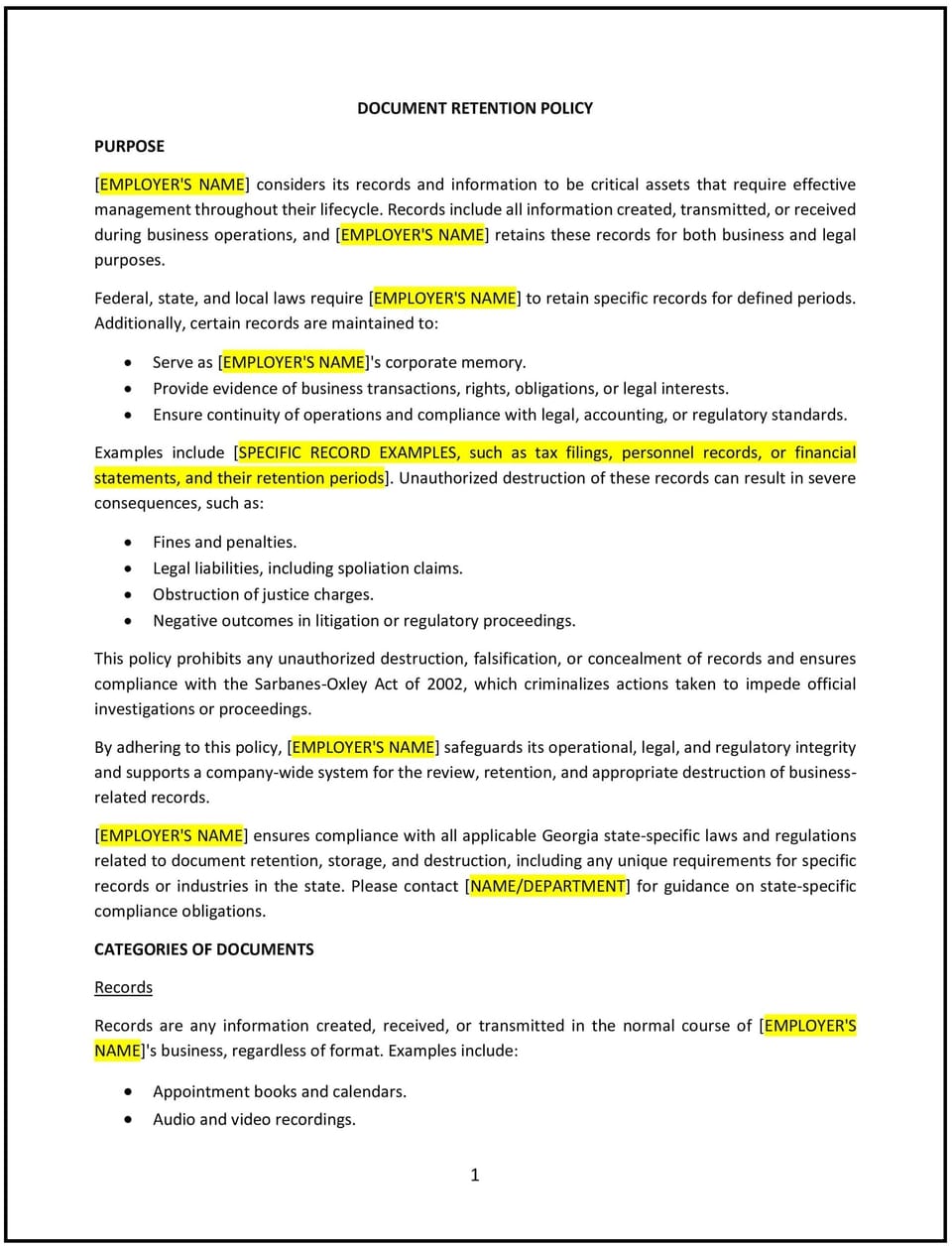Document retention policy (Georgia): Free template

Document retention policy (Georgia)
This document retention policy is designed to help Georgia businesses manage their records effectively by establishing guidelines for retaining, storing, and disposing of documents. The policy outlines retention periods, secure storage practices, and methods for disposing of records to ensure the organization operates efficiently and responsibly.
By implementing this policy, businesses can improve recordkeeping, safeguard sensitive information, and support operational needs.
How to use this document retention policy (Georgia)
- Define document categories: Clearly classify documents into categories such as financial records, contracts, employee files, and operational data.
- Set retention periods: Specify how long each category of document should be retained, tailoring timelines to Georgia-specific legal and business requirements.
- Establish storage methods: Provide guidelines for securely storing physical and electronic records, ensuring they are accessible but protected from unauthorized access.
- Include disposal procedures: Outline the process for securely destroying documents that are no longer needed, such as shredding or using certified digital deletion tools.
- Assign responsibilities: Designate employees or teams responsible for implementing and monitoring document retention and disposal practices.
- Address litigation holds: Provide instructions for retaining documents related to ongoing or anticipated legal actions, regardless of standard retention periods.
- Conduct regular audits: Schedule periodic reviews of stored documents to ensure retention schedules are followed, and outdated records are disposed of properly.
- Review and update regularly: Periodically review the policy to reflect changes in Georgia laws, industry standards, or business needs.
Benefits of using this document retention policy (Georgia)
Implementing this policy provides several advantages for Georgia businesses:
- Enhances efficiency: Organized recordkeeping ensures quick access to important documents when needed.
- Reduces storage costs: Timely disposal of unnecessary records minimizes physical and digital storage expenses.
- Safeguards sensitive information: Secure storage and disposal practices help protect confidential data from breaches.
- Supports legal readiness: Maintaining records for the appropriate duration ensures businesses are prepared for audits or legal inquiries.
- Reflects Georgia-specific needs: Tailoring retention schedules and practices to local regulations and business practices ensures practicality and relevance.
Tips for using this document retention policy (Georgia)
- Communicate guidelines: Ensure employees understand the retention schedules and their role in managing documents effectively.
- Leverage technology: Use document management systems to automate retention and disposal processes, reducing manual effort.
- Train employees: Provide training on secure storage, retrieval, and disposal practices to minimize risks of data breaches or mismanagement.
- Monitor compliance: Conduct regular audits to ensure the policy is being followed and address any gaps in implementation.
- Adapt to changes: Be prepared to adjust retention periods or practices based on updates to Georgia laws or business operations.
Q: What types of documents are covered by this policy?
A: The policy applies to a wide range of records, including financial reports, contracts, employee files, operational documents, and customer information.
Q: How are retention periods determined?
A: Retention periods are based on Georgia laws, industry standards, and business needs. Businesses should review their requirements regularly to stay current.
Q: How should businesses store sensitive documents?
A: Sensitive documents should be stored securely, using locked cabinets for physical files and password-protected or encrypted systems for digital records.
Q: What is the process for disposing of records?
A: Records should be securely destroyed, such as shredding physical files or using certified digital deletion tools for electronic records.
Q: What is a litigation hold, and how does it affect document retention?
A: A litigation hold is a directive to retain specific documents related to ongoing or anticipated legal actions, overriding standard retention schedules.
Q: Who is responsible for implementing this policy?
A: Specific employees or teams, such as records managers or department heads, should be designated to oversee document retention and disposal.
Q: How often should this policy be reviewed?
A: The policy should be reviewed annually or whenever changes in Georgia laws or business operations necessitate updates.
This article contains general legal information and does not contain legal advice. Cobrief is not a law firm or a substitute for an attorney or law firm. The law is complex and changes often. For legal advice, please ask a lawyer.


